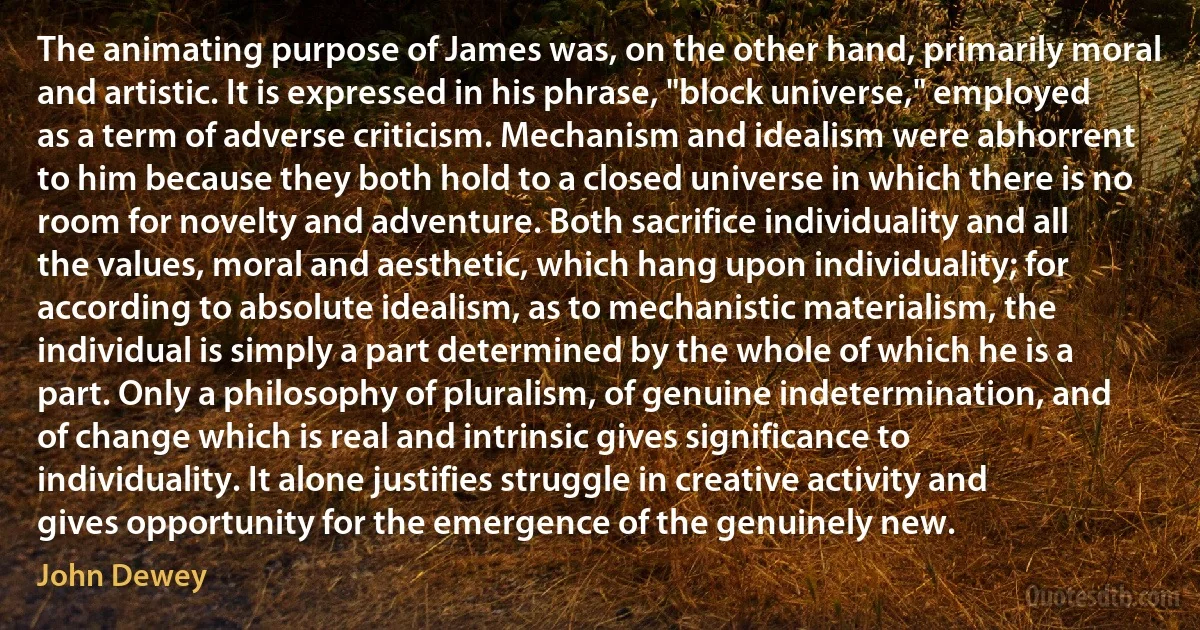
The animating purpose of James was, on the other hand, primarily moral and artistic. It is expressed in his phrase, "block universe," employed as a term of adverse criticism. Mechanism and idealism were abhorrent to him because they both hold to a closed universe in which there is no room for novelty and adventure. Both sacrifice individuality and all the values, moral and aesthetic, which hang upon individuality; for according to absolute idealism, as to mechanistic materialism, the individual is simply a part determined by the whole of which he is a part. Only a philosophy of pluralism, of genuine indetermination, and of change which is real and intrinsic gives significance to individuality. It alone justifies struggle in creative activity and gives opportunity for the emergence of the genuinely new.
John DeweyRelated topics
adventure aesthetic block change creative criticism emergence gives hang hold idealism intrinsic materialism mechanism opportunity pluralism purpose real room significanceRelated quotes
In conclusion, it appears to me that nothing can be more improving to a young naturalist, than a journey in distant countries. It both sharpens, and partly likewise allays that want and craving, which, as Sir J. Herschel remarks, a man experiences although every corporeal sense is fully satisfied. The excitement from the novelty of objects, and the chance of success, stimulate him to increased activity. Moreover as a number of isolated facts soon become uninteresting, the habit of comparison leads to generalization. On the other hand, as the traveller stays but a short space of time in each place, his descriptions must generally consist of mere sketches, instead of detailed observation. Hence arises, as I have found to my cost, a constant tendency to fill up the wide gaps of knowledge, by inaccurate and superficial hypotheses.

Charles Darwin
I tell you, struggle is what is missing in the lives of most young people today. If they think I'm going to support them while they create great works of art, then they've missed the point of my work, of my life! In the process of becoming a writer or an artist one has to be willing to starve. Struggle is the most invaluable experience of all. Suffering seems to be the inevitable fate of the creative sensitive types. Poverty, disease, death, unrequited love affairs, and disappointments of every sort fan the flame of the artistic spirit. The greatest works of art were not created by spoiled brats. They were born for the most part out of a sense of despair, and if not despair then just plain hard work. Somewhere along the line the artist learns the art of transformation.

Henry Miller
In France at least, the history of science and thought gives pride of place sciences, sciences of the necessary, all close to philosophy: one can observe in their history the almost uninterrupted emergence of truth and pure reason. The other disciplines, however - those, for example, that concern living beings, languages, or economic facts - are considered too tinged with empirical thought, too exposed to the vagaries of chance or imagery to age old traditions and external events, for it to be supposed that their history could be anything other irregular. At most, they are expected to provide evidence of a state of mind, an intellectual fashion, a mixture of archaism and bold conjecture, of intuition and blindness. But what if empirical knowledge, at a given time and in a given culture, did possess a well defined regularity.

Michel Foucault
If there must be a god in the house, must be,
Saying things in the room and on the stair,
Let him move as the sunlight moves on the floor,
Or moonlight, silently, as Plato's ghost
Or Aristotle's skeleton. Let him hang out
His stars on the wall. He must dwell quietly.
He must be incapable of speaking, closed,
As those are: as light, for all its motion, is;
As color, even the closest to us, is;
As shapes, though they portend us, are.
It is the human that is the alien,
The human that has no cousin in the moon.
It is the human that demands his speech
From beasts or from the incommunicable mass.
If there must be a god in the house, let him be one
That will not hear us when we speak: a coolness
A vermillioned nothingness, any stick of the mass
Of which we are too distantly a part.

Wallace Stevens
The first and most necessary topic in philosophy is that of the use of moral theorems, such as, "We ought not to lie;" the second is that of demonstrations, such as, "What is the origin of our obligation not to lie;" the third gives strength and articulation to the other two, such as, "What is the origin of this is a demonstration." For what is demonstration? What is consequence? What contradiction? What truth? What falsehood? The third topic, then, is necessary on the account of the second, and the second on the account of the first. But the most necessary, and that whereon we ought to rest, is the first. But we act just on the contrary. For we spend all our time on the third topic, and employ all our diligence about that, and entirely neglect the first. (51).

Epictetus
